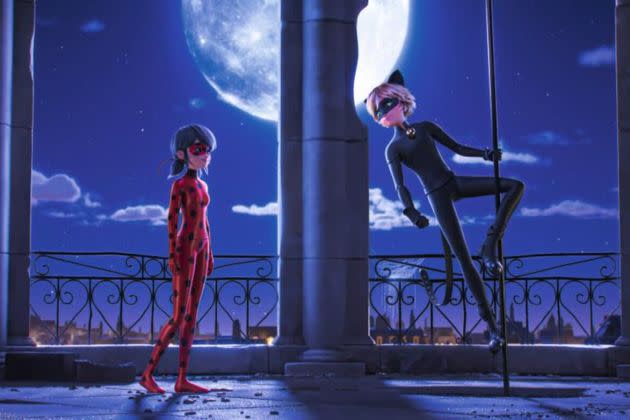‘Miraculous: Ladybug & Cat Noir,’ Animated Girl-Power Musical, Conquers French Box Office
- Oops!Something went wrong.Please try again later.

While Greta Gerwig’s girl-power blockbuster “Barbie” is ruling over the French box office, another much younger female-led franchise, “Miraculous: Ladybug & Cat Noir” has managed to pull approximately €8 million ($8.9 million) at the local B.O., from more than 1.1 million tickets, since bowing on July 5.
Budgeted around $80 million and directed by Jeremy Zag, “Miraculous: Ladybug & Cat Noir” ranks as one of France’s most ambitious animated films to date.
More from Variety
'Ladybug & Cat Noir Awakening' Animated Musical Feature in Production (EXCLUSIVE)
Skydance Developing 'Miraculous: Tales of Ladybug and Cat Noir' Film, TV Projects
Featuring eight original songs and a postcard-worthy Parisian backdrop, the musical film broke ground as the first female-powered superhero movie set in the French capital. Even as it faces stiff competition from “Barbie” and Christopher Nolan’s “Oppenheimer,” “Miraculous: Ladybug & Cat Noir” has enough legs to match or surpass recent non-U.S. animated hits such as “Ballerina,” which sold 1.8 million tickets in France. It garnered 318,144 admissions on its opening day in theaters, a record for a French animated film. In Germany, the movie sold 586,148 tickets in three weeks and is currently the leading family title at the box office.
“Miraculous: Ladybug & Cat Noir” follows ordinary teenager Marinette, who transforms into the superhero Ladybug. Bestowed with magical powers of creation, Ladybug must unite with her opposite, Cat Noir, to save Paris as a new villain unleashes chaos onto the city.
The film is based on the hit series created by Thomas Astruc and designed by Nathanaël Bronn, which has been airing on TF1 in France since 2015, as well as over 120 additional territories worldwide. Although the franchise is fairly young, it’s become a global phenomenon, garnering more than 15 billion views on YouTube and selling more than 150 million products in merchandising. A sign of its popularity in France, Ladybug entered the Grévin Museum in Paris in 2017 as a wax figure, joining the likes of Albert Einstein and Brad Pitt.
“We were the first to push for the girl power,” says Zag, who co-wrote the movie with Bettina López Mendoza, producing it via his banner ZAG Studios alongside Aton Soumache at Mediawan Kids & Family and Daisy Shang at China’s Fantawild Animation.
“Back when we started pitching ‘Miraculous,’ it was a gamble: TV channels didn’t want that type of content. They had in mind that girls played with dolls and boys played with swords, so we were confined to these gender clichés,” Zag continues. The producer scored when he was able to convince Soumache, the producer of the “Iron Man” series reboot, and later Toei Animation, to come on board as co-producers on the series. Toei Animation, which is behind cult anime series from the 1980s such as “Dragon Ball” and “Goldorak,” gave the franchise a Japanese DNA and flavor.
Soumache said he was immediately drawn to Zag’s “panache, risk-taking and passion.”
“His vision for ‘Miraculous’ was daring at the time, totally precursor, and that’s what got me in. I’ve always taken risks in my career, from producing a black-and-white animated film like ‘Renaissance’ to partnering with Marvel on ‘Iron Man,'” says Soumache.
Soumache notes that fact they were “able to secure the financing for such a big budget from their international partners shows that there’s an appetite for this type of large-scale, well-polished independent animated features.”
Zag, who grew up in France in the 1980s, said he grew up watching Japanese anime created by Toei, which is why getting the studio on board felt like a “childhood dream.”
Zag says “mangas resonate today because they deal with today’s issues and they’re inspirational: their characters are always underdogs who start out as vulnerable, lonely and insecure, and slowly they discover a power within their heart that allows them to beat their enemies and rise up.”
With “Miraculous,” the producers updated the Magical Girls sub-genre, a Japanese fantasy anime revolving around young girls who possess magical abilities. “In the 1980s, the magical girls were stereotypical ultra sexy girls, and in “Miraculous” we gave our female characters a different look, slightly more masculine, inspired by Marvel, my other childhood passion,” says Zag, adding that the producers also gave the show a “French touch” and a Parisian setting that people love.
Zag also composed the original score, which includes eight songs, and co-wrote the lyrics with Michael Gracey, Chris Read and Britt Burton.
“Miraculous: Ladybug & Cat Noir” premieres on Netflix on July 28 in a flurry of international territories, including the U.S., Canada and Latin America. Zag, who is now based in Paris after living in L.A. for many years, is now developing several features including “Melody,” another animated musical feature with Katy Perry attached to play the title role.
Best of Variety
Sign up for Variety’s Newsletter. For the latest news, follow us on Facebook, Twitter, and Instagram.
